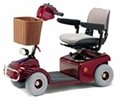Alzheimer Symptoms in Elderly
Alzheimer symptoms consist of a gradual loss of mental, social and functional abilities.
The disease usually begins with small changes in a senior's behaviour and memory.
It eventually includes decreased judgement and reasoning, difficulty performing daily tasks, changes in mood and losses in language abilities.
It goes beyond normal forgetfulness such as losing your keys or forgetting where you are parked.
If your loved one has been diagnosed with Alzheimer's or you believe they have early signs of it, it's important to learn as much as you can so be prepared.
There are lots of great tips and strategies for caring for elderly with Alzheimer's disease on other pages of our site.
Overview of Alzheimer Symptoms
1) Difficulty Performing Familiar Tasks
- Unable to follow familiar recipe
- Forgets has already eaten
2) Memory Loss Affecting Day-to-day Functioning
- Asks same question over and over, sometimes in the same conversation
- Cannot remember recent events, sometimes immediately afterward
3) Personality Changes
- May become suspicious, withdrawn, apathetic, fearful
4) Mood or Behaviour Changes
- Unusual mood swings (from happy to tearful) for no clear reason
- Becoming sad or irritable
5) Language Difficulties
- Has difficulty retrieving words, forgets simple words, forgets what certain items are called
- Has difficulty following or understanding a conversation
- More difficulty with following, understanding and recalling reading
- materials such as books and newspapers
6) Poor or Decreased Judgement
- Dresses inappropriately for the weather, wears heavy sweater on a hot day
- Doesn't recognize when medical attention is needed
7) Misplacing Items
- Puts things in inappropriate places, ie. keys in the coffee tin
- Forgets where items are repeatedly
8) Problems with Abstract Thinking
- Problems with money or simple calculations
- May not understand things like what a birthday is
- Unable to balance cheque book or understand a bill
9) Disorientation of Place and Time
- Do not know the day, date, month year
- Do not know where they are, particularly familiar places
10) Loss of Initiative
- May need prompting to be involved in anything from household chores to social activities
- Become increasing unable to make decisions or become very passive
- Loses interest in usual hobbies or activities
Importance of Early Diagnosis
Early diagnosis of Alzheimer's Disease is important for a variety of reasons. When Alzheimer symptoms in elderly are in the mild stage, it may be quite relieving for your elderly parent to know there is a reason for these changes.
It will also provide them time to have input about the decisions involved in their treatment.
The family will also have a better understanding of the reasons for the changes in their loved one and can begin to plan for the future (finances, treatment options, housing, etc.) and set up support systems.
Memory enhancer medications are available that may help to slow the progression of the disease and are usually most effective if started in the stage of mild impairment. This should be discussed with the physician involved.






New! Comments
Have your say about what you just read! Leave me a comment in the box below.